 The budget committee of the European Parliament has said it wants to maintain a planned increase of 10 per cent in the EU research budget for 2012. Under the committee’s proposal, research would obtain the largest increase of any major category of spending, as envisaged in the framework already agreed for spending from 2007 to 2013. However, in response to the financial crisis, the Council of Ministers has requested that research spending in 2012 be cut from the planned €12.56 billion to €11.43bn, in effect remaining the same as last year.
The budget committee of the European Parliament has said it wants to maintain a planned increase of 10 per cent in the EU research budget for 2012. Under the committee’s proposal, research would obtain the largest increase of any major category of spending, as envisaged in the framework already agreed for spending from 2007 to 2013. However, in response to the financial crisis, the Council of Ministers has requested that research spending in 2012 be cut from the planned €12.56 billion to €11.43bn, in effect remaining the same as last year.
/ Full archive
Google Under-the-Earth: Seeing Beneath Stonehenge
Google Under-the-Earth: Seeing Beneath Stonehenge is the first application of its kind to transport users around a virtual prehistoric landscape, exploring the magnificent and internationally important monument, Stonehenge.
The application was developed by Bournemouth University archaeologists, using new field data gathered during their work with colleagues from the universities of Sheffield, Manchester, Bristol, Southampton and London as part of the Stonehenge Riverside Project. Google Under-the-Earth works by adding layers of archaeological information to Google Earth technology.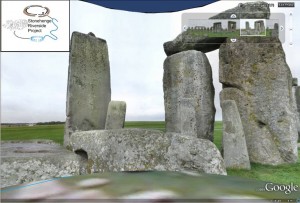
The unique visual experience lets users interact with the past like never before. Highlights include taking a visit to the Neolithic village of Durrington Walls, a trip inside a prehistoric house and the opportunity to see reconstructions of Bluestonehenge at the end of the Stonehenge Avenue and of the great timber monument called the Southern Circle, as they would have looked more than four thousand years ago.
The project is funded by the Arts and Humanities Research Council (AHRC) and Google Research Awards, a program which fosters relationships between Google and the academic world as Google fulfils its mission to ‘organize the world’s information and make it universally accessible and useful.’
But this fabulous educational and cultural tool does not end with Stonehenge. Archaeological scientist Dr Kate Welham, project leader at Bournemouth University, explained that it is the start of something much bigger.
“It is envisaged that Google Under-the-Earth: Seeing Beneath Stonehenge could be the start of a new layer in Google Earth. Many of the world’s great archaeological sites could be added, incorporating details of centuries’ worth of excavations as well as technical data from geophysical and remote sensing surveys in the last 20 years,” she said.
Dr Nick Snashall, National Trust Archaeologist for Stonehenge and Avebury World Heritage Site, said: “The National Trust cares for over 2000 acres of the Stonehenge Landscape. Seeing Beneath Stonehenge offers exciting and innovative ways for people to explore that landscape. It will allow people across the globe, many of whom may never otherwise have the chance to visit the sites, to share in the thrill of the discoveries made by the Stonehenge Riverside team and to appreciate the remarkable achievements of the people who built and used the monuments.”
You can download the application from the Google Under-the-Earth: Seeing Beneath Stonehenge site. The tool is easy to use and requires Google Earth to be installed on your computer.
The Royal Society Wolfson Laboratory Refurbishment Grants Scheme 2012
 The Wolfson Foundation has announced a further call for proposals under the Laboratory Refurbishment Grants Scheme. It aims to improve the existing physical infrastructure in UK universities to promote high quality scientific research. Up to £1.5m in funds will be available for the 2012 round.
The Wolfson Foundation has announced a further call for proposals under the Laboratory Refurbishment Grants Scheme. It aims to improve the existing physical infrastructure in UK universities to promote high quality scientific research. Up to £1.5m in funds will be available for the 2012 round.
The scheme has been running for 13 years. To limit the number of applications – and thereby reduce the effort involved in submissions, the scheme has focused on specific research topics, usually for two years at a time. The present focus is on imaging – interpreted widely to include astronomy, materials science, nano structures, biological and medical applications. We are looking for novel research projects which can include both image capture and subsequent interpretation, coupled with an identified opportunity to locate the work in space recovered from previous usage.
This scheme does not support:
– Research on existing imaging equipments for the same application;
– Commercialisation of a proven-concept/prototype into a near-market product;
– Refurbishment of laboratories housing established imaging equipment(s) for research purposes.
– Research into labelling of ‘samples’ including luminescence, chromophore, radio-labelling etc. and ‘sample’ preparation
The scheme note contains more details of the scheme and how to apply. They cannot accept more than one proposal from any department in this round. A statement of support for applications will need to be provided by the PVC.
To discuss this opportunity further, please contact RKE Operations.
BU screening of The PHD Movie goes down a treat!
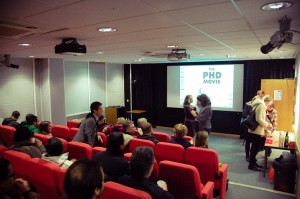 Last night was the BU premiere of The PHD Movie, a film based on the popular comic strip PHD Comics.
Last night was the BU premiere of The PHD Movie, a film based on the popular comic strip PHD Comics.
The event was attended by approximately 50 BU staff and students, plus a couple of local residents. Despite running out of popcorn early on, everyone had a good time and there was lots of laughter! This was a fantastic opportunity for our PGR students and supervisors to get together socially and have fun 🙂
We’re hoping to hold another screening of The PHD Movie one lunchtime in January – watch this space for further information!
You can always catch up with the latest comic strip from PHD Comics on the PG Research page of the BU Research Blog!
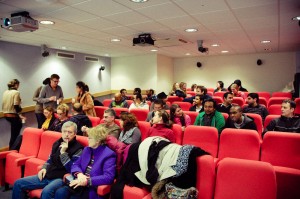
Neelie Kroes, Vice-President of the European Commission (Digital Agenda), reads BU research, but…
 Neelie Kroes, Vice-President of the European Commission responsible for the Digital Agenda, made her annual set piece speech at the Media Forum in Avignon, France on 19 November: Who feeds the artist?
Neelie Kroes, Vice-President of the European Commission responsible for the Digital Agenda, made her annual set piece speech at the Media Forum in Avignon, France on 19 November: Who feeds the artist?
Speaking of economic reward: if that is the aim of our current copyright system, we’re failing here too. [then follows a paragraph summarising the BU studies in the area, but without reference] 1000 euros a month is not much to live off. Often less than the minimum wage. But most artists, and not only the young ones at the early stages of their career, have to do so. Half the fine artists in the UK, half the “professional” authors in Germany, and, I am told, an incredible 97.5% of one of the biggest collecting society’s members in Europe, receive less than that paltry payment of 1000 euros a month for their copyright works. Of course, the best-paid in this sector earn a lot, and well done to them. But at the bottom of the pyramid are a whole mass of people who need independent means or a second job just to survive.
[before indicating a change in policy direction] Let’s not wait for a financial crisis in the creative sector to happen to finally adopt the right tools to tackle it.
—
The data is clearly from:
AUTHORS’ EARNINGS FROM COPYRIGHT AND NON-COPYRIGHT SOURCES: A SURVEY OF 25,000 BRITISH AND GERMAN WRITERS (ALCS Study 2007) http://www.cippm.org.uk/alcs_study.html
COPYRIGHT CONTRACTS AND EARNINGS OF VISUAL CREATORS: A SURVEY OF 5,800 BRITISH DESIGNERS, FINE ARTISTS, ILLUSTRATORS AND PHOTOGRAPHERS (DACS Study 2011) http://www.cippm.org.uk/publications/dacs-report.html
A possible source is my contribution to a Hearing in the European Parliament last June. http://www.cippm.org.uk/news/2011/jun/ne001-future-of-copyright-in-the-digital-era.html
So there is a challenge… I could blog: “European Commission Vice-President reads BU research”.
But no source is cited. Did our studies matter? Is there a causal link to a change in the direction of copyright policy?
In REF terms, was there Impact of research?
Howard Davis publishes in the highly rated journal – Public Law
 Dr Howard Davis, from the Law Department in the Business School, has a piece coming out in Public Law (A* in the Excellence Research Australia journal ranking list) on the right to an open hearing in the context of mental health law. Courts and tribunals dealing with the affairs of those with serious mental health problems normally conduct their affairs in private with no access of the public or the media. This is to protect confidentiality and privacy. But private hearings go against the fundamental principle of open justice. The article explores recent developments in which mental health tribunals (which deal with questions whether someone detained in a mental hospital ought to be released) and the Court of Protection (whose concerns include sorting out the property etc of those unable to look after themselves) have both allowed some degree of publicity to their proceedings. In the tribunal case it was a patient who had been detained in Broadmore for 23 years who successfully sort a public hearing in order, he hoped, to publicise his position and his criticisms of the regime. In the COP case the application came from the media. The patient is a renowned pianist who is also autistic and there is signicant public interest in his position. The media had a limited right to publicise information gleaned from the proceedings.
Dr Howard Davis, from the Law Department in the Business School, has a piece coming out in Public Law (A* in the Excellence Research Australia journal ranking list) on the right to an open hearing in the context of mental health law. Courts and tribunals dealing with the affairs of those with serious mental health problems normally conduct their affairs in private with no access of the public or the media. This is to protect confidentiality and privacy. But private hearings go against the fundamental principle of open justice. The article explores recent developments in which mental health tribunals (which deal with questions whether someone detained in a mental hospital ought to be released) and the Court of Protection (whose concerns include sorting out the property etc of those unable to look after themselves) have both allowed some degree of publicity to their proceedings. In the tribunal case it was a patient who had been detained in Broadmore for 23 years who successfully sort a public hearing in order, he hoped, to publicise his position and his criticisms of the regime. In the COP case the application came from the media. The patient is a renowned pianist who is also autistic and there is signicant public interest in his position. The media had a limited right to publicise information gleaned from the proceedings.
Academic Writing Workshop 13th December
 Have you a paper to write? Do you want to write it well? Do you need space to focus on developing academic writing skills? This full-day course is designed for staff at an early stage of their academic careers who write papers or reports as part of their research work. The course consists of intensive tuition and gives participants immediate, useable methods of improving style, developing arguments, strengthening organisation and avoiding common errors, all with the aim of producing succinct and informative prose in a well-organised academic framework.
Have you a paper to write? Do you want to write it well? Do you need space to focus on developing academic writing skills? This full-day course is designed for staff at an early stage of their academic careers who write papers or reports as part of their research work. The course consists of intensive tuition and gives participants immediate, useable methods of improving style, developing arguments, strengthening organisation and avoiding common errors, all with the aim of producing succinct and informative prose in a well-organised academic framework.
The day itself involves instruction, group exercises and discussion, all designed to enable participants to increase the quality of their writing and to develop their confidence and critical thinking. In addition, there is advice on how to successfully communicate the subject matter. You can view an outline of the day.
This will be a full day workshop taking place on Tuesday 13th December. If you would like to attend please email Susan Dowdle asap as there are only a few places remaining.
Consumer behaviour in virtual worlds
A prestigious journal has awarded two Bournemouth University (BU) academics the ‘Best Paper’ accolade for their work in the largely unstudied domain of consumer behaviour in digital virtual spaces, including video games, virtual communities and the web.
‘Concepts and practices of digital virtual consumption’, by BU’s Dr Janice Denegri-Knottand Dr Mike Molesworth, was among the most downloaded work published by Consumption Markets and Culture last year.
The paper examines digital virtual consumption (such as owning luxury cars in a video game), the relationship it has within the real material world and the appeal of consumption that is deprived of a material, physically tangible form.
 Denegri-Knott and Molesworth think of consumption on spaces like eBay, Amazon and World of Warcraft as somewhere between the consumers’ imagination and material consumption, and believe it is charged with transformative potential for its users.
Denegri-Knott and Molesworth think of consumption on spaces like eBay, Amazon and World of Warcraft as somewhere between the consumers’ imagination and material consumption, and believe it is charged with transformative potential for its users.
Consumers can fulfil all sorts of daydreams, such as finding a designer dress on eBay, or performing the fantasy of being a powerful wizard. They don’t just look and ask ‘what might it be like’, but may ‘try on’ being an entrepreneur, someone with wealth, a collector, a trader, an advertiser, a criminal, a hero, a warrior, or many other ways of being.
Their roles are enhanced as the scripts available to them expand and can be tested within relatively small timescales. The digital virtual individual may be an avid collector one year, a warrior hero the next, and a successful entrepreneur the year after that. The video game player may be a successful criminal one week and a racing driver the next.
Denegri-Knott and Molesworth believe more emphasis is needed on the relationship between the virtual realm and the real-world and, as digital virtual consumption is largely unstudied, they propose an integrative view for further research.
“The paper was written in the spirit of mapping out potential avenues for research, and also to give us some kind of conceptual frame to make sense of consumption in emerging digital virtual spaces,” said Dr Denegri-Knott. “We now have a body of work that looks at the way in which users consume through eBay, from which we have been able to draw some insights on the acceleration of consumer desire and the problems this creates. We now would like to develop the theme of transformative potential in digital virtual consumption; that is to see how consumers make sense of their experiences and how they integrate these into their everyday lives.”
The pair are also now researching the experience of owning digital virtual goods, in particular the ways in which consumers become attached to certain goods, and how they maintain their preferential stature.
Dr Denegri-Knott concluded: “We were both delighted and surprised to hear that our paper was so well received by the readers of the journal and by the judging panel. This is a real achievement for the Emerging Consumer Cultures Group (ECCG).”
PGR Training Workshops – Dec 2011
Sessions for the BU Researcher Development Programme in December 2011 are as follows:
Research Ethics Professor Holger Schutkowski
- Date: Wednesday 7 December
- Time: 10:30-12:30
- Room: PG22
- Prior booking essential by emailing graduateschool@bournemouth.ac.uk
- Please include one line about your research ethics issues or concerns
Researchers must Write Professor Matthew Bennett
- Date: Wednesday 7 December
- Time: 14:00 – 15:30
- Room: PG22
- Prior booking essential by emailing graduateschool@bournemouth.ac.uk
- Basic introduction to the importance of writing in research
Academic Writing Sue Mitchell (external)
- Date: Both the Tuesday and Wednesday sessions are now full
- Time: 09:oo – 17:00
- Room: PG22
- Prior booking essential by emailing graduateschool@bournemouth.ac.uk
- Academic Writing Skills: improving your publications; grants
These sessions are primarily aimed at new PGRs however all PGRs and ECRs are welcome. Prior booking is essential on some sessions where places are limited.
New simple EC FP7 guide coming to you!
It is with great pleasure I can announce that the printed copies of ‘The Simple Guide to European Commission FP7 Funding’ I have been working on over the last few months have arrived. This guide covers everything you need to know – from funding topics, to searching for partners, to completing the proposal form – all in a jargon free, simple format.
I have popped a copy for every research active academic at BU in the internal post. If you haven’t received one by Friday and would like me to send you one, please drop me an email. Happy reading! 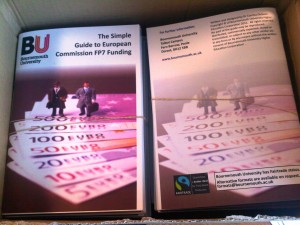
EU funding from BU available
 Just a reminder to you all about our fantastic two EU funding opportunities which were launched last week and already generated much interest.
Just a reminder to you all about our fantastic two EU funding opportunities which were launched last week and already generated much interest.
The BU EU Academic Development Scheme (EUADS) is for all newbie’s in EU research, comprising of an amazing training and mentorship programme and a personal budget to help you create a proposal. The deadline for this scheme is 13.01.12
The BU EU Networking Fund (EUNF) is for anyone who wants to travel to network with potential partners. There isn’t a deadline for this but the funds are limited so be quick and don’t miss out!
More details on both schemes as well as application forms can be found in my previous blogpost!
Research can help companies to increase revenue and create jobs
Watch this excellent short video from BU’s Professor Dean Patton on how research has helped high growth firms and established businesses to develop further, through increased revenue and job creation.
To see other BU videos on YouTube go to the BU YouTube page!
Proposals set for a Supersized Erasmus Programme
 The EC has proposed **Supersized** version of the Erasmus Prorgramme with a whopping 70% increase in funding and more wide ranging for education funding 2014-2020 called ‘Erasmus for All’ (totaling €19-billion).
The EC has proposed **Supersized** version of the Erasmus Prorgramme with a whopping 70% increase in funding and more wide ranging for education funding 2014-2020 called ‘Erasmus for All’ (totaling €19-billion).
Erasmus for All would merge the 7 existing programmes, such as the Lifelong Learning or Youth in Action programmes, under one single banner to increase efficiency, make it easier to apply for funding, reduce fragmentaton and duplication.
Erasmus for All aims to enable education systems to ‘deliver the knowledge and skills needed in an increasingly globalised labour market’, according to the EC. Several programme names, such as Leonardo or Comenius, will disappear and be branded as Erasmus actions. “In setting up an integrated single programme, it makes sense to avoid multiple names and to capitalise on the popularity and awareness of the Erasmus brand” the EC said.
The programme would include three “key actions”: learning mobility (66% of the budget), including funding for student and staff mobility; cooperation for innovation (26%), to increase links between education and business, as well as between Europe and other regions; and policy reform (5%), including the modernisation of higher education and Bologna reform. The remaining 3 % of the programme’s budget would fund operating costs in national agencies.
The proposal will now be discussed by the European Parliament and Member States through the Council of the EU. It is expected that there might be some modifications to the proposal during the co-decision process, which is expected to be completed by the end of 2013 to allow the new programme to start on 1 January 2014.
Applying to the EC for funding? Simples!
 One of the major criticisms of EC funding is the complication of funding, rules and paperwork. Horizon 2020 seems a huge merger of activities which have been funded in FP7 under several different programmes, and generic rules are being developed in order to create substantial simplification for participants.
One of the major criticisms of EC funding is the complication of funding, rules and paperwork. Horizon 2020 seems a huge merger of activities which have been funded in FP7 under several different programmes, and generic rules are being developed in order to create substantial simplification for participants.
Horizon 2020 will address the call from participants around Europe for a pragmatic shift towards administrative and financial simplification and states that the management of European research funding should be more trust-based and risk-tolerant towards participants.
Simple funding rules should reduce the administrative costs for participation and will contribute to a reduction of financial errors so good news all round!
The PHD Movie – screening at BU on Monday 5 December

Love PHD Comics? Then come to the screening of The PHD Movie, hosted at BU on Monday 5 December!
The PHD Movie is being shown at universities around the world and premiered at UCLA in Los Angeles in September. It has also been shown at Harvard University, Yale University, University of Sydney, CERN, and multiple screenings at the Max Planck Institute.
In the UK the movie is only scheduled to be screened at UCL, Oxford, Glasgow, Cranfield, Bristol, Imperial College, York, Newcastle, Liverpool, Birmingham, Cambridge, Edinburgh, Brunel and Bournemouth!
The PHD Movie is a live-action adaptation of the popular online comic strip by Jorge Cham (www.phdcomics.com). It was filmed on location at and was produced in partnership with the California Institute of Technology (Caltech).
The film introduces audiences to the unique and funny culture of Academia and follows four graduate students (Cecilia, Mike, Tajel and the “Nameless Grad Student”) as they struggle to find balance between research, teaching and their personal lives with humor and heart.
The Movie was produced and directed by and stars real PhD students and researchers.
The Bournemouth screening will be held on Monday 5 December between 5pm-7pm in the Screening Room (W241), Weymouth House on the Talbot Campus.
It is free to attend!
Places at the screening are limited so complete the booking form below if you’d like to come along.

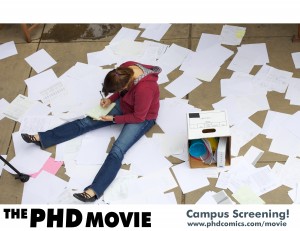
Vijay Reddy attends the United Nations Conference on Green Economy and Sustainable Development
Dr Maharaj Vijay Reddy was invited to attend the United Nations Research Institute for Social Development’s conference on ‘Green Economy and Sustainable Development’ at the European headquarters of the United Nations Office in Geneva UNOG (10-11 Oct 2011). The aim of this cutting-edge conference was to debate and identify the sustainability and green economy priorities and to prepare and shape subsequent social policy discussions before the Rio+20 global summit next year.
The UNOG conference received invited attendees from different parts of the world from several international organisations (e.g. UNDESA, UNESCAP, UNEP, UNESCO, and UNDP), many national and international funding agencies (e.g. World Bank, DFID, AUSAid), research institutes and leading universities. Key areas covered in the discussions include: the Global Economic Crisis, Nature in the Market-World, The Social Dimensions of Carbon Trading, Economic Growth, Social Divides and Sustainable Development, Climate Change, Double Injustice and Social Policy, The Global Political Economy, Governance in Environmental Policy, Realizing Pro-Poor Development in the Carbon Commodity Chain, The Potential and Constraints on the Payment for Ecosystem Services Markets, Agriculture and Rural Development, An Institutional Analysis of Biofuel Policies and their Social Implications in Developing Countries, and Future Research and Directions for Rio+20.
PGR students – interested in some funding to travel?

Santander provides BU with funding for research students or staff to travel to universities in the Santander overseas network to work on a specific piece of work and develop links. There are 4 x £5000 scholarships available with a deadline of 9th December.
This is an excellent opportunity to travel to other countries such as the USA or South America and enhance your PhD by working with international researchers in your field and potentially enhancing your future career by developing international networks. Priority is given to research students and early career researchers.
Details on how to apply are available in this earlier blog post.
Phew – Marie Curie here to stay til 2020!
 I am delighted to announce that Marie Curie Actions (which normally sit in the People Programme of FP7) looks like it is here to stay!
I am delighted to announce that Marie Curie Actions (which normally sit in the People Programme of FP7) looks like it is here to stay!
The goal of Marie Curie in Horizon 2020 is to ensure optimum development and dynamic use of Europe’s intellectual capital in order to generate new skills and innovation and, thus, to realise its full potential across all sectors and regions. The EC sees well-trained, dynamic and creative researchers as the vital raw material for the best science and the most productive research-based innovation.
THE EC feels that Europe hosts a large and diversified pool of skilled academics and l this needs to be constantly replenished, improved and adapted to the rapidly evolving needs of the labour market; particularly as a disproportionate number of researchers will hit retirement over the next few years and the research intensity of the EU economy is increasing.
 The goal is, by leveraging additional funds, to increase the numerical and structural impact of this scheme and to foster excellence at national level in researchers training, mobility and career development. Additional goals are to monitor progress, identify gaps and to increase their impact. Indicators shall be developed and data related to researchers‘ mobility, skills and careers analysed, seeking synergies and close coordination with the policy support actions on researchers, their employers and funders carried out under the ” Inclusive, innovative and secure societies” challenge.
The goal is, by leveraging additional funds, to increase the numerical and structural impact of this scheme and to foster excellence at national level in researchers training, mobility and career development. Additional goals are to monitor progress, identify gaps and to increase their impact. Indicators shall be developed and data related to researchers‘ mobility, skills and careers analysed, seeking synergies and close coordination with the policy support actions on researchers, their employers and funders carried out under the ” Inclusive, innovative and secure societies” challenge.
The EC will target early career researchers – either doctoral or postdoc – and call for EU to develop state-of-the-art, innovative training schemes, consistent with the highly competitive and increasingly inter-disciplinary requirements of research and innovation. Strong involvement of businesses, including SMEs and other socio-economic actors, will be needed to equip researchers with the innovation skills demanded by the jobs of tomorrow. It will also be important to enhance the mobility of these researchers, as it currently remains at too modest a level: in 2008, only 7 % of European doctoral candidates were trained in another Member State, whereas the target is 20 % by 2030. Mid-career mobility will also be targeted not only between countries, but also between the public and private sectors as this creates a strong stimulus for learning and developing new skills and is a key factor in cooperation between academics, research centres and industry across countries.
Former Marie Curie schemes have fostered some excellent results and this will continue with future Marie Curie Actions which will encourage new, creative and innovative types of training such as industrial doctorates, involving education, research and innovation players who will have to compete globally for a reputation of excellence. By providing Union funding for the best research and training programmes following the Principles for Innovative Doctoral Training in Europe, they will also promote wider dissemination and take-up, moving towards more structured doctoral training. Marie Curie grants will also be extended to the temporary mobility of experienced researchers and engineers from public institutions to the private sector or vice versa, thereby encouraging and supporting universities, research centres and businesses to cooperate with one another on a European and international scale.
Funding will most likely be around the following 4 areas:
- Fostering new skills by means of excellent initial training of researchers: The goal is to train a new generation of creative and innovative researchers, able to convert knowledge and ideas into products and services for economic and social benefit in the Union. Key activities shall be to provide excellent and innovative training to early-stage researchers at post-graduate level via interdisciplinary projects or doctoral programmes involving universities, research institutions, businesses, SMEs and other socio-economic groups from different countries. This will improve career prospects for young post-graduate researchers in both the public and private sectors.
- Nurturing excellence by means of cross-border and cross-sector mobility: The goal is to enhance the creative and innovative potential of experienced researchers at all career levels by creating opportunities for cross-border and cross-sector mobility. Key activities shall be to encourage experienced researchers to broaden or deepen their skills by means of mobility by opening attractive career opportunities in universities, research institutions, businesses, SMEs and other socio-economic groups all over Europe and beyond. Opportunities to restart a research career after a break shall also be supported.
- Stimulating innovation by means of cross-fertilisation of knowledge: Key activities shall be to support short-term exchanges of research and innovation staff among a partnership of universities, research institutions, businesses, SMEs and other socio-economic groups, both within Europe and worldwide. This will include fostering cooperation with third countries.
- Increasing the structural impact by co-funding the activities: Key activities shall be, with the aid of a co-funding mechanism, to encourage regional, national and international organisations to create new programmes and to open existing ones to international and intersectoral training, mobility and career development. This will increase the quality of research training in Europe at all career stages, including at doctoral level, will foster free circulation of researchers and scientific knowledge in Europe, will promote attractive research careers by offering open recruitment and attractive working conditions and will support research and innovation cooperation between universities, research institutions and enterprises and cooperation with third countries and international organisations.











 REF Code of Practice consultation is open!
REF Code of Practice consultation is open! BU Leads AI-Driven Work Package in EU Horizon SUSHEAS Project
BU Leads AI-Driven Work Package in EU Horizon SUSHEAS Project Evidence Synthesis Centre open at Kathmandu University
Evidence Synthesis Centre open at Kathmandu University Expand Your Impact: Collaboration and Networking Workshops for Researchers
Expand Your Impact: Collaboration and Networking Workshops for Researchers ECR Funding Open Call: Research Culture & Community Grant – Apply now
ECR Funding Open Call: Research Culture & Community Grant – Apply now ECR Funding Open Call: Research Culture & Community Grant – Application Deadline Friday 12 December
ECR Funding Open Call: Research Culture & Community Grant – Application Deadline Friday 12 December MSCA Postdoctoral Fellowships 2025 Call
MSCA Postdoctoral Fellowships 2025 Call ERC Advanced Grant 2025 Webinar
ERC Advanced Grant 2025 Webinar Update on UKRO services
Update on UKRO services European research project exploring use of ‘virtual twins’ to better manage metabolic associated fatty liver disease
European research project exploring use of ‘virtual twins’ to better manage metabolic associated fatty liver disease